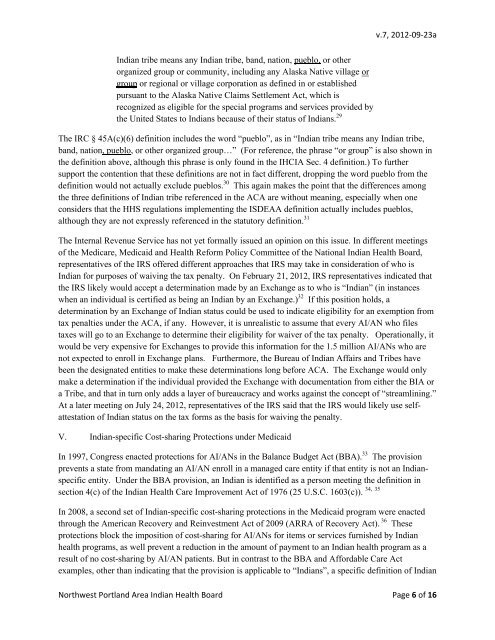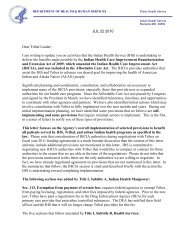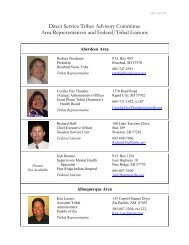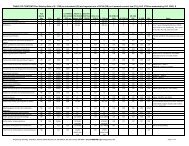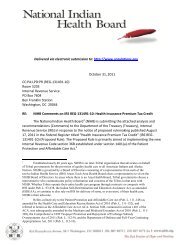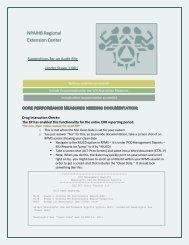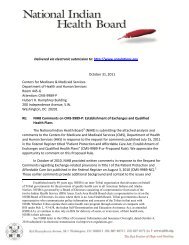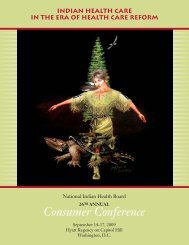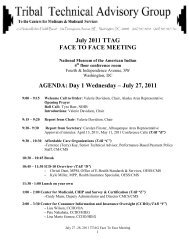mmpc - National Indian Health Board
mmpc - National Indian Health Board
mmpc - National Indian Health Board
You also want an ePaper? Increase the reach of your titles
YUMPU automatically turns print PDFs into web optimized ePapers that Google loves.
<strong>Indian</strong> tribe means any <strong>Indian</strong> tribe, band, nation, pueblo, or other<br />
organized group or community, including any Alaska Native village or<br />
group or regional or village corporation as defined in or established<br />
pursuant to the Alaska Native Claims Settlement Act, which is<br />
recognized as eligible for the special programs and services provided by<br />
the United States to <strong>Indian</strong>s because of their status of <strong>Indian</strong>s. 29<br />
v.7, 2012‐09‐23a<br />
The IRC § 45A(c)(6) definition includes the word “pueblo”, as in “<strong>Indian</strong> tribe means any <strong>Indian</strong> tribe,<br />
band, nation, pueblo, or other organized group…” (For reference, the phrase “or group” is also shown in<br />
the definition above, although this phrase is only found in the IHCIA Sec. 4 definition.) To further<br />
support the contention that these definitions are not in fact different, dropping the word pueblo from the<br />
definition would not actually exclude pueblos. 30 This again makes the point that the differences among<br />
the three definitions of <strong>Indian</strong> tribe referenced in the ACA are without meaning, especially when one<br />
considers that the HHS regulations implementing the ISDEAA definition actually includes pueblos,<br />
although they are not expressly referenced in the statutory definition. 31<br />
The Internal Revenue Service has not yet formally issued an opinion on this issue. In different meetings<br />
of the Medicare, Medicaid and <strong>Health</strong> Reform Policy Committee of the <strong>National</strong> <strong>Indian</strong> <strong>Health</strong> <strong>Board</strong>,<br />
representatives of the IRS offered different approaches that IRS may take in consideration of who is<br />
<strong>Indian</strong> for purposes of waiving the tax penalty. On February 21, 2012, IRS representatives indicated that<br />
the IRS likely would accept a determination made by an Exchange as to who is “<strong>Indian</strong>” (in instances<br />
when an individual is certified as being an <strong>Indian</strong> by an Exchange.) 32 If this position holds, a<br />
determination by an Exchange of <strong>Indian</strong> status could be used to indicate eligibility for an exemption from<br />
tax penalties under the ACA, if any. However, it is unrealistic to assume that every AI/AN who files<br />
taxes will go to an Exchange to determine their eligibility for waiver of the tax penalty. Operationally, it<br />
would be very expensive for Exchanges to provide this information for the 1.5 million AI/ANs who are<br />
not expected to enroll in Exchange plans. Furthermore, the Bureau of <strong>Indian</strong> Affairs and Tribes have<br />
been the designated entities to make these determinations long before ACA. The Exchange would only<br />
make a determination if the individual provided the Exchange with documentation from either the BIA or<br />
a Tribe, and that in turn only adds a layer of bureaucracy and works against the concept of “streamlining.”<br />
At a later meeting on July 24, 2012, representatives of the IRS said that the IRS would likely use selfattestation<br />
of <strong>Indian</strong> status on the tax forms as the basis for waiving the penalty.<br />
V. <strong>Indian</strong>-specific Cost-sharing Protections under Medicaid<br />
In 1997, Congress enacted protections for AI/ANs in the Balance Budget Act (BBA). 33 The provision<br />
prevents a state from mandating an AI/AN enroll in a managed care entity if that entity is not an <strong>Indian</strong>specific<br />
entity. Under the BBA provision, an <strong>Indian</strong> is identified as a person meeting the definition in<br />
34, 35<br />
section 4(c) of the <strong>Indian</strong> <strong>Health</strong> Care Improvement Act of 1976 (25 U.S.C. 1603(c)).<br />
In 2008, a second set of <strong>Indian</strong>-specific cost-sharing protections in the Medicaid program were enacted<br />
through the American Recovery and Reinvestment Act of 2009 (ARRA of Recovery Act). 36 These<br />
protections block the imposition of cost-sharing for AI/ANs for items or services furnished by <strong>Indian</strong><br />
health programs, as well prevent a reduction in the amount of payment to an <strong>Indian</strong> health program as a<br />
result of no cost-sharing by AI/AN patients. But in contrast to the BBA and Affordable Care Act<br />
examples, other than indicating that the provision is applicable to “<strong>Indian</strong>s”, a specific definition of <strong>Indian</strong><br />
Northwest Portland Area <strong>Indian</strong> <strong>Health</strong> <strong>Board</strong> Page 6 of 16


